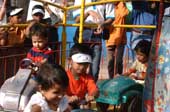 |
| There’s hope yet: AIDS orphans enjoy themselves at an amusement park in Calcutta |
Five-year-old Rhea bounces around the house with her bright red strawberry-shaped soft toy tucked under her arm, talking nineteen to the dozen. That’s a huge change from this time last year when she could neither speak nor walk.
Rhea is an AIDS orphan who is HIV-positive herself. When her mother lay dying of the disease, Rhea seemed doomed to the same fate. But she was rescued and adopted — not by a celebrity do-gooder like Angelina Jolie, but by a woman named Sheela, a middle aged, middle class housewife in Mumbai.
Normally, AIDS orphans like Rhea are avoided like the plague by would-be adoptive parents. “Nobody wants to adopt AIDS orphans,” says Dr Ashok Rau, the founder of the Freedom Foundation in Bangalore that works with people with HIV/AIDS in India and Africa. Even Freedom Foundation’s own experiment five years ago of getting six couples of diverse socio-economic backgrounds to adopt AIDS orphans proved disastrous, says Dr Rau. “The experience was so traumatic for the adopted child that we had to call off the programme,” he says.
Actually, even Rhea’s entry into Sheela’s life in June 2005 was accidental. “Last year, when her mother had to be rushed to the hospital, the little girl was left with her neighbours. But her severe diarrhoea proved to be too much for them to handle. So they took her back to her house and left her there, bolting the door from the outside,” narrates Sheela. It was only a couple of days later that a friend of her mother discovered the girl lying in a terrible mess. “When I saw her in that state, I felt awful,” says Sheela. So she decided to care for her till the mother stabilised. But that was not meant to be. Six months later, Rhea’s mother passed away, having legally relinquished her child to Sheela.
Now Sheela is learning to be a mother all over again. She stays up half the night tending to Rhea as the child suffers from insomnia which is a side effect of the Anti- Retro Viral Therapy (ART) that she is undergoing. The drug cocktail has also made her hyperactive. “She cannot sit still and talks non-stop. I’m struggling to keep up with her,” exclaims Sheela.
Today, Rhea no longer frets for her mother as she used to. She no longer clings to Sheela all day, nor does she wet her bed. She tells visitors that her mother has gone to heaven though she is still a bit confused as to why her mother had cotton plugs in her ears and nose on the day of her funeral.
As for Sheela, she spends most of her waking hours lovingly shielding the little girl from anything that will endanger her parchment-like immune system. She has done away with the mosquito repellent and shuts the windows to keep out the fumes of firecrackers because Rhea is allergic to both. “Her CD4 count (an indicator of the health of the immune system) has fallen by half, touching 250,” she says.
Sheela says she takes it one day at a time. But she does hope to see Rhea grow from being a pre-schooler.
And in a supportive, loving environment, that is not too much to expect. Take the case of Rajesh, a 15-year-old AIDS orphan, who, with the backing of his Swedish adoptive parent to-be, Anna Svensson, has gone from, “simply wanting to live, to wanting to be a computer technician.” And that’s not all. “He hopes to have a normal family with children of his own one day,” says Svensson.
In the next six months, Svensson, a social welfare officer with a local government agency in Stockholm, hopes to have Rajesh with her and re-united with his brother (whom she has adopted as well). Like Sheela, Anna has disclosed Rajesh’s HIV status to only very close family. She has not even told his brother, 10-year-old Samir, who is not HIV positive. Says she, “I’ll leave the decision to disclose this information to Rajesh himself as he may not be socially accepted if word gets around.”
Meanwhile, plans are afoot to have Rajesh enrolled in an English medium school. “He’s a very intelligent and sweet boy and stands first in his class (ninth standard),” says Anna.
Rajesh, who lives at Freedom Foundation’s home for children with HIV/AIDS in Bangalore, leads an active life, except for the occasional flu. His CD4 count is 509 cells (normal CD4 counts range from 1000 cells upwards) and Anna, who is prepared for any eventuality, says she just hopes that he stays healthy. “I have the support of friends and family, should anything go wrong,” she says.
However, people like Sheela and Anna, who want to take up the responsibility of an HIV-positive orphan, are few and far between. Given the near absence of couples or singles willing to adopt AIDS orphans, hospices like Bel-Air, a project of the Indian Red Cross in Panchgani, have been trying to get their extended family to adopt these children. But this succeeds only in rare cases. “Most relatives mistreat these children,” says Archana Shinde, a counsellor at Bel-Air.
Pramilbai, a 60-year-old woman from Phaltan in interior Maharashtra, has been single-handedly caring for her nine-year-old granddaughter who is an AIDS orphan. “I’m willing to spend all of the little money I have to make her well,” she says. Neighbours keep telling her not to waste her money, as the child will die anyway. “They are dead wrong,” she says.
If only there were more people like Pramilbai to take care of these unfortunate children who have been struck with HIV/AIDS through no fault of their own.










